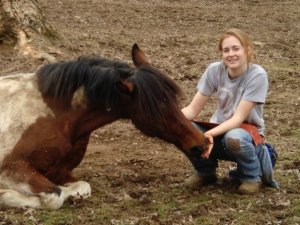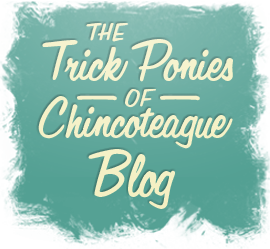Food for Thought
I find sometimes that the “horse community” looks down on trainers that use treats to reward their horses. I think that the main resistance to this is that most people think that their horses will get grabby (which is definitely true if its not done properly) and that if they were to use treats in training it would become a crutch and they would always have to use treats from then on. These common mis-conceptions are valid, but most people that believe this are uneducated in reward-based training.
I found a video that addresses “horse mugging” when using clicker training.
I have had to address the “horse mugging” issue with all of my ponies. Being that they are ponies they can get grabby about the food, which if not addressed could lead to dangerous situations of your horse nipping at people for food. When I first began clicker training Minnow I noticed as we progressed he began to get a little grabby, he started pulling at my clothing in an effort to get his reward faster. To stop this unwanted behavior I placed him in a stall with a stall guard up. I stood on the other side with a large juicy apple in my hand. I would place the apple just in reach of Minnow’s mouth, but I would not “offer” it to him. (I consider offering to be placing my flat open palm right under his mouth.) Everytime Minnow grabbed at the apple without being offered it I closed my hand and pulled it away from him. When he did something other than grabbing at the apple (for him he began turning his head to the side – I have found that some horses “collect” themselves instead) he would then get a click and would be “offered” a different treat. It didn’t take long before Minnow realized he had to be offered his reward or else he wouldn’t get anything (I love my smart pony).

Blitz being "offered" a reward for laying down
And as far as being dependent on the treats – I think Minnow proves that you do not always need the reward to get the performance. I clicker trained him to be an exceptional mounted games pony – and not once during competition did I ever need to reward him (aside from a pat and a “good boy”). He worked and performed for me because I have made learning enjoyable for him. He doesn’t need his “treat” all of the time, but the fact that he knows it may be coming makes him work that much harder. Once I have my ponies trained for a specific skill I for the most part eliminate the treats as well as the clicker. They learn to work off my voice commands and cues – and they are happy for the occasional treat I may offer. I believe the reward-based horse training methods are one of the best out there because they tap into the horse’s number 1 focus in life – food. These methods may not be for everyone, and I’m not trying to convert everyone I meet or anything, all I’m saying is it works for me and my horses. I think any method that humanely helps you reach your goals with your horse is a success, afterall aren’t we all striving for the same thing – a partnership with our animals? I know I am.
-KD
If you enjoyed this post, please consider to leave a comment or subscribe to the feed and get future articles delivered to your feed reader.



What a great little article here. I can’t wait to get home and watch the video (I’m at work right now)! But I just wanted to give a little feedback. You have lots of good points about using treats for reward-based training. I think too, a lot of horses – especially those “left brained” types – need extra incentive, at least in the beginning.
Keep up the good work ponypaintings. I will continue to follow you on Twitter 🙂
Thanks! I most certainly agree that rewards help the “left brained” horses. My first clicker-pony (Minnow) is very right brained, but I’m so glad I discovered the clicker training with him first, because when I got my other two (who I eventually discovered were left brained) the clicker training really stepped in to help me with them.
Blitz and Boomer (my left brained 1/2 brothers) both seem to respond very well to the clicker training. The “reward” is such a strong motivator for them, especially for Blitz who WAS one of those sluggish kick-ride horses. I stress was because now he’s got a much stronger “go” button.
Anyway thanks for the feedback – and the follow on twitter!
-KD
http://www.ponypaintings.com
This is also the same, age-old argument among dog trainers. The truth of the matter is that science has proven you can more easily train a behavior with a reward. Food is historically one of the greatest motivators out there. I’ve found that with operant conditioning, training goes much, much faster and it leaves both the trainer and the animal with a more positive relationship. Now, that’s not to say that anyone should allow their thousand pound horse to walk all over them… There’s a place for everything after all.
I for one, am a supporter of positive training methods.
Great article!